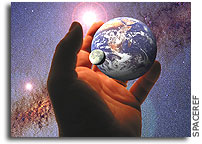Astrobiology Serves NASA and The National Interest – Statement Prepared by Principal Investigators of the NASA Astrobiology Institute

Astrobiology is the interdisciplinary study of the origins, evolution, distribution, and future of life on Earth and in the universe. It melds the understanding of life on Earth, the nature of our solar system and its potential to support life, and the search for habitable environments and life on planets around other stars.
The President’s budget calls for cuts to the NASA astrobiology program that would abdicate U.S. leadership and threaten our capabilities in this field.
Astrobiology is central to NASA’s science program and exploration mission, to enhancing workforce competitiveness, and to the public interest:
Science
- Astrobiology addresses far bigger questions in science than are accessible by any single discipline, including the age-old question of whether there is life beyond Earth.
- Astrobiology provides an overarching theme to integrate disparate space science programs, ranging from origins and evolution of life, to planetary habitability and global change, to planets around other stars.
- Astrobiology leverages new avenues for discovery and scientific development across disciplines.
- Studying the Earth as one of many planets contributes to understanding how the Earth works as an integrated system, a topic of particular relevance to the future of our home planet.
The Mission of NASA
- Astrobiology is central to the Space Exploration Vision, to the strategic roadmap of the NASA Science Mission Directorate, and to the intellectual rationale for space exploration as put forward by the National Research Council.
- Many missions in planetary science and astrophysics are motivated directly by astrobiology themes, whether they are so labeled or not. NASA missions continue to discover potentially habitable environments in our solar system, as with the recent discovery of possible liquid water on Saturn’s moon Enceladus. Astrobiology plays a key role in prioritization of missions, as exemplified by the high priority of a mission to Jupiter’s moon Europa.
- Identifying in situ resources necessary to support life, such as water, is an important objective for astrobiology and also enables future human exploration beyond Earth.
- We need to sustain today’s investment in astrobiology in order to understand the results from ongoing missions and to help develop future missions.
Workforce and Competitiveness
- Astrobiology attracts and retains outstanding students through its exciting content, and trains them in interdisciplinary research, at a time when maintaining scientific and technological competitiveness in our workforce is a national priority.
- More than 200 colleges and universities nationwide teach astrobiology as part of their curricula. Astrobiology provides a compelling means of training non-science majors in science, thereby contributing to general scientific literacy.
- Research and analysis programs preferentially support young scientists, so reductions in these programs risk disproportionate loss of early-career scientists.
- The long lead time necessary for training scientists requires a continuing commitment in order to retain capability.
The Public
- Astrobiology addresses fundamental questions about life that are of deep interest to the public, and is a key factor attracting them to space exploration.
- Astrobiology outreach enhances the public understanding of science.
- The nation’s investment in astrobiology provides enormous dividends.
Prepared by the Principal Investigators of the NASA Astrobiology Institute:
- Jillian Banfield, University of California, Berkeley
- David Des Marais, NASA Ames Research Center, Moffett Field, California
- Steven D’Hondt, University of Rhode Island
- Bruce Jakosky, University of Colorado
- Rocco Mancinelli, SETI Institute, Mountain View, California
- Victoria Meadows, California Institute of Technology, Pasadena
- Karen Meech, University of Hawaii
- Michael Mumma, NASA Goddard Space Flight Center, Greenbelt, Maryland
- Hiroshi Ohmoto, The Pennsylvania State University
- Lisa Pratt, Indiana University
- Mitchell Sogin, Marine Biological Laboratory, Woods Hole, Massachusetts
- Sean Solomon, Carnegie Institution of Washington, Washington, D.C.
- Michael Thomashow, Michigan State University
- Peter Ward, University of Washington
- Neville Woolf, University of Arizona
- Edward Young, University of California at Los Angeles
March 26, 2006









